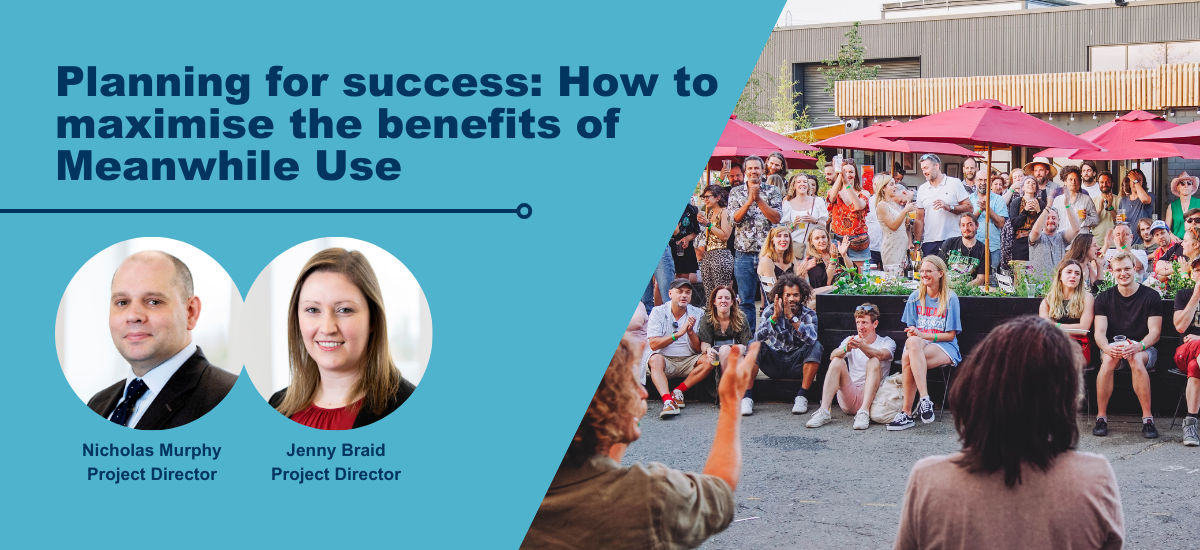Planning for success: How to maximise the benefits of Meanwhile Use
From outdoor cinemas and pop-up restaurants to makerspace workshops and cultural spaces, Meanwhile Use delivers activity, engagement and business to large regeneration projects as they are developed out.
However, careful planning is needed to get the full benefits and to avoid pitfalls further down the development pipeline.
Meanwhile use can pave the way for future development while delivering some financial return.
It can support local businesses and start-ups, while events and leisure offers can foster connections with the local community and attract new people to the area.
Meridian Water in North London is an example. It’s a 25-year project led by Enfield Council on 210 acres that will eventually create 10,000 homes and 6,000 jobs serving as a catalyst for social economic transformation in the area. However, whilst it is developed, the unused land and buildings are hosting a variety of temporary uses to bring in business, people and revenue.
One of Meridian Water’s key meanwhile partners is Building Bloqs, which is the largest open-access workshop in Europe, providing facilities and equipment for makers and manufacturers. It’s not for profit and gives a low-cost entry into business for start-ups and local businesses.
Penny Halliday, Director of Meridian Water says “The partnership between Bloqs and the Council was key due to the role of this project within the wider context of the Meridian Water regeneration. Here, we enabled the Bloqs project through match funding, supporting the appointment of a professional team and acting as proprietor to provide a suitable leasehold to Bloqs. We are delighted that Bloqs has received such positive recognition and awards.”
Elsewhere on the site, from the people behind Printworks (Canada Water’s successful Meanwhile club), the Drumsheds occupied the site of a disused warehouse and adjacent field to host events and festivals, including Field Day. To make way for the site infrastructure works, it is moving to the former Ikea site so it can continue to contribute to the Meanwhile economy at Meridian Water.
Meanwhile uses can develop their own brand; BOXPARK is a good example. The food and beverage ‘pop-up’ first established in Shoreditch has become a destination in Croydon and Wembley, with others emulating the concept.
Head of Development at BOXPARK Matthew McMillan comments “With our soon to be opened Liverpool site we have tried to encourage as many independent food operators as possible to have the chance to put their businesses forward. The cost of fitting out a restaurant or food venue is high which can put off some really talented chefs and bakers. Over our thirteen-year history we have seen a number of food operators become fully established as a result of taking space at one of our venues.”
And a new development can be more marketable to residents and businesses if there is activity and amenities on the doorstep. In fostering start-ups, it creates potential demand for permanent business space.
But all this only works, if you plan carefully.
At Meridian Water, many buildings have been demolished down to the concrete slab, making a good platform for temporary uses. Availability is plotted as development progresses.
Some sites might only be available for a relatively short period, so buildings are designed to be demountable and moved to new locations to get the best value.
The Skills Academy is one such building. The site is earmarked for housing in the master plan, but the Academy can be dismantled and rebuilt elsewhere when the residential development begins. It means the amenity stays on the site but doesn’t become an obstacle to the longer-term plans.
As it can take time to get planning and build a temporary building, setting up a strategy and identifying locations ahead of a plot becoming available can help maximise the value of the temporary uses across a large site.
Space also needs to be designed so that if the development timeline changes, Meanwhile Use can be extended. Equally important is not being handcuffed to a long lease or license, if development plans progress more rapidly. The inherent flexibility to respond to the market is key.
Planning an exit strategy for Meanwhile Use is equally important. If a community has got used to having a certain amenity, taking it away after a period can cause problems. Expectations need to be managed and, potentially, alternatives found.
Similarly, for businesses using temporary space, is there somewhere for them to go when the space is up for redevelopment? If a particular Meanwhile Use does really well, are there ways it can be incorporated into the longer-term plans?
Considering how the site will change around Meanwhile Use during its operation, also, needs to be considered. Noisy entertainment venues and events work when there is construction going on around them, but once homes become occupied, it is less conducive, so leases need to be flexible.
On any large regeneration project, there are many moving parts, but a carefully planned and programmed Meanwhile Use strategy can deliver many benefits while minimising the potential pitfalls.

Stace has worked on Meridian Water and BOXPARK mentioned above. If you would like to find out more about the benefits of Meanwhile Use, please get in touch.






